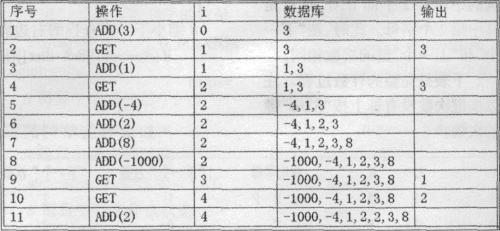Title Description
Black Box is a primitive database. It can store an array of integers, and a special variable i. The very beginning of Black Box is empty. And i is equal to 0. The Black Box to deal with a string of commands.
Only two commands:
ADD (x): x elements into the BlackBox;
GET: i plus 1, then the output Blackhox in small numbers of i.
Remember: the i-th smaller number is the number of Black Box in ascending sort order after a large i-th element. E.g:
We have to demonstrate what a command 11 command string. (As shown below)

Now asked to find the best treatment for a given command string. ADD and GET command up to 200,000 respectively. Now represented by two array of integers command string:
1.A (1), A (2), ... A (M): a series of elements to be placed in the Black Box. Each number is no more than the absolute value of the integer 2 billion, M $ 200000. For example, the above example is A = (3,1, a 4,2,8, -1000,2).
2.u (1), u (2), ... u (N): represents u (j) elements are placed inside the Black Box after the emergence of a GET command. For example, in the above example u = (l, 2,6,6). Input data is not wrong ruling.
Input Format
The first line, two integers, M, N.
Second row, M integers, indicates A (l)
……A(M)。
Third row, N integers, represents u (l)
... u (N).
Output Format
The output of the output string of Black Box derived command string, a digit line.
Sample input and output
7 4 3 1 -4 2 8 -1000 2 1 2 6 6
3 3 1 2
Description / Tips
For 30% of the data, M≤10000;
For 50% of the data, M≤100000:
To 100% of the data, M≤200000.
A large root heap maintenance before the i-th
A small root maintain the rest of the heap
It can also be directly balanced tree
#include <bits/stdc++.h> using namespace std; priority_queue<int> q1; priority_queue<int, vector<int>, greater<int> > q2; int m, n; int a[200000 + 10], u[200000 + 10]; int main(){ cin >> m >> n; for(int i = 1; i <= m; i++) cin >> a[i]; for(int i = 1; i <= n; i++) cin >> u[i]; for(int i = 1; i <= u[1]; i++){ q2.push(a[i]); } cout << q2.top() << endl; for(int i = 2; i <= n; i++){ q1.push(q2.top()); q2.pop(); for(int j = u[i - 1] + 1; j <= u[i]; j++){ q1.push(a[j]); q2.push(q1.top()); q1.pop(); } cout << q2.top() << endl; } return 0; }